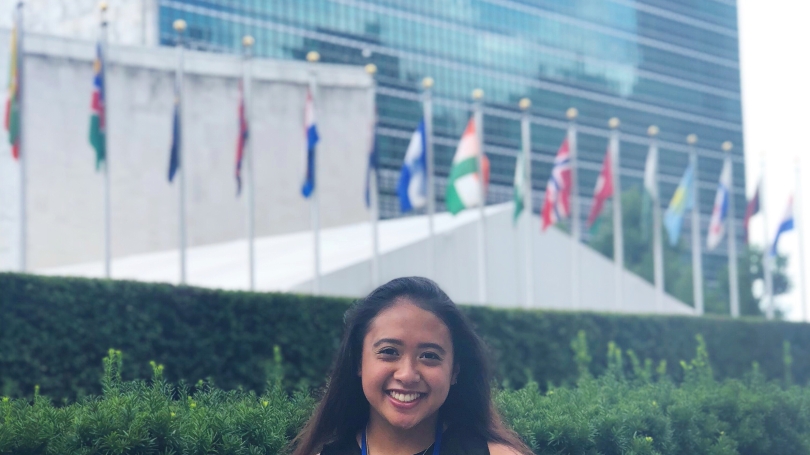
- Public Policy
- Leadership
- Funding
- News & Events
- About the Center
Back to Top Nav
Back to Top Nav
Back to Top Nav
Back to Top Nav
Ezekiella Carlos '19 interned at the United Nations during the summer 2018 term. The following is an excerpt from her internship report.
This summer, I interned in the Department of Field Support (DFS) at the United Nations, which falls within the UN Secretariat at Headquarters. The Secretariat, one of the six major organs of the UN, includes the Secretary-General and all of the international staff who carry out the civil service function of the UN as mandated by the other organs such as the General Assembly or the Security Council. DFS works very closely with the Department of Peacekeeping Operations to ensure that the mandated peacekeeping and other operations run as smoothly and as effectively as possible. The specific role of DFS is to provide support – for example, in the form of air and ground transportation, accommodations and food for peacekeepers, or medical evacuations – to peace operations, including peacekeeping, special political, and other field missions.
Within DFS, I worked as one of two Operations Support Interns in the front office of Assistant Secretary-General (ASG) Lisa Buttenheim. My early work included preparing briefing and concept notes for both the Under-Secretary-General (USG) and ASG, particularly for important and pressing situations in the field or for events that they were planning to attend. I also prepared several research papers for the office that provided background on certain policies and proposed new options that DFS could potentially look into. Finally, I was asked to write the first cuts of a number of speeches that were to be given by the USG and ASG at upcoming events.
My third week, we were sent to support my supervisor’s colleague in the Office for the Coordination of Humanitarian Affairs (OCHA) during the Economic and Social Council’s Humanitarian Affairs Segment. This help included preparing background notes and budget analyses for the head of the comprehensive review, as well as attending meetings and taking notes. Additionally, I took on a research project in which I was able to look into the duty of care practices of organizations that also employ staff in high-risk environments. I was then able to examine the UN’s duty of care practices and suggest how the department may improve in fulfilling this responsibility. Ultimately, I learned to trust my own judgement and my ability to produce quality work, while also reminding myself to not be afraid to ask questions when I deem necessary.
The most valuable thing that I learned about working in a public policy organization was that you must know and, frankly, expect that there will be always be criticism for some aspect of the organization, because of how bureaucratically the whole organization seems to operate. I think that this internship helped me realize that I see myself as one of the individuals who would stick with an organization in an attempt to change it. The work and environment that I immersed myself in this summer granted me a new and more global mindset. The very nature of the work I was doing, along with the people that I was doing that work with, re-sparked my interest in international affairs, but with the added realization that there is always more than one perspective to be considered. Moving forward in my academics, I think that this realization will help me approach the material in my Government and Sociology majors with a more critical lens and the work I produce with a more full, thorough, and comprehensive approach. Finally, my unforgettable and incredibly valuable experience at the United Nations this summer would not have been possible without the generous grant from the Rockefeller Center.
The Rockefeller Internships Program has funding for Dartmouth undergraduate students to help defray the cost of living expenses associated with a full-time, unpaid, leave-term internships in the fields of public policy, public affairs, and social entrepreneurship.